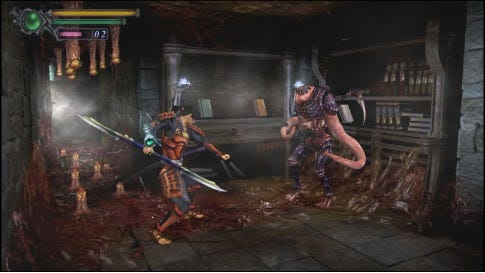Onimusha: Warlords review - a good value remaster of a decent game
Onimusha: Warlords is out today, but you probably didn’t realise that.
While Capcom’s marketing might is focused on delivering Resident Evil 2 Remake and Devil May Cry 5, Onimusha: Warlords has been in the periphery, Naruto-running onto modern consoles and PC with a price point of £15.99.
Warlords boasts a range of improvements: HD graphics, widescreen support, Trophies and Achievements, a fresh soundtrack, and the ability to switch from the classic tank controls to an analogue input system. All of this means it’s the game you remember, almost exactly as you remember it. It’s Capcom casting out its rod to see who still wants a nibble on its 8 million-selling series.
The game originally started as a twist on the Resident Evil formula - you might be a ninja, but you love those health-giving green herbs as much as Leon Kennedy and Snoop Dogg. But melee combat takes the spotlight here, along with a sprinkling of puzzle solving and gated exploration.
It’s surprising how great it still is, voice acting, story, and cutscenes aside. The swordplay is simple but requires tactical play, asking you to block and dodge incoming attacks, unleash sword flurries on enemies, and stick enemies who are down for extra damage. If you time an attack just as an enemy strikes, you do a speedy upwards swing, finishing them in a single, flashy slice. It’s almost impossible to time, but it occasionally happens by accident, adding a satisfying random element to encounters and making you feel amazing in the process.
On top of this, there’s a simple magic system where three weapons boast different magical attacks. You can also upgrade your abilities at shrines by using the souls of the defeated, which you must manually hoover up by holding down a button, sucking them into your gauntlet. You need to do this before they dissipate, adding a risk and reward factor to fights, since the act leaves you vulnerable. It all works to make combat more than a button mashing affair, while inputs feel immediate and impactful.
Rather than searching for keys and crests - though there is a bit of that - many of the areas are locked by pulsating, colour-coded, organic growths. You unlock them by upgrading a jewel associated with each of your three elemental weapons - thunder, fire, and wind - to progress. This forces you to pump souls into those jewels, instead of increasing your weapon strength, which means you need to grind respawning enemies if you want maximum power. It gives the game its own unique pace, and makes it feel closer to FromSoftware’s works than Capcom’s in places, though admittedly nowhere near as challenging.
The challenge here comes from wrestling with your own patience. In the years since Onimusha’s release, we’ve come to expect little conveniences in video games. You know, such things as skippable cutscenes. In one particular section, I almost put the game down forever. There are three puzzles, one after the other, and two of them can kill you instantly and send you back to the title menu where you have to load up your last manual save. This is prior to an unskippable cutscene.
The game often has a saving icon in the bottom corner of the screen, teasing a checkpoint, but I have no idea what purpose it serves. Apparently none at all. [Note: Capcom says this saves your 'Honors', essentially the Achievement system]. Once you understand the logic of the puzzles, they’re a doddle, but I could have done without watching that cutscene three times to figure that logic out.
Warlords is also a short game. I have no specific memories of my first time through the original release, but I still managed to zip through the experience in around four hours. Like the original Resident Evil, it’s designed to be mastered and to improve your runtime with each playthrough.
With those caveats aside, Onimusha: Warlords is a damn steal at £15.99. Where most publishers are trying to squeeze as much as possible out of people, juicing those nostalgia glands for every penny, here we have a sensible price point for a decent older game that’s been blown up to look passable on a modern screen.



